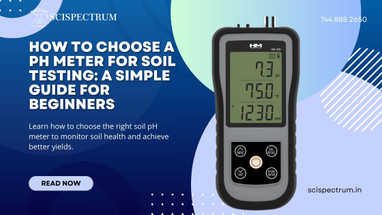Posted by Scispectrum on 25th Sep 2025
How to Choose a pH Meter for Soil Testing: A Simple Guide for Beginners
Table of Contents
Introduction: Why soil pH testing is important.
What is a soil pH meter and how it works.
Types of pH meters for soil testing (pen-type, portable, benchtop, multiparameter).
Key features to consider for soil testing.
Step-by-step guide to using a soil pH meter.
Top product recommendations from Scispectrum catalog (with features and prices).
FAQs.
Conclusion
Introduction: Why Soil pH Matters for Your Plants
Did you know that the secret to thriving plants starts beneath the surface? Soil pH—a measure of how acidic or alkaline your soil is—affects how well plants absorb nutrients. Too acidic (pH < 6.0) or too alkaline (pH > 7.5), and your plants might starve even in rich soil! Testing soil pH helps you:
- Fix nutrient deficiencies.
- Choose the right plants for your garden.
- Improve fertilizer efficiency.
In this guide, we’ll simplify how to pick the perfect pH meter for soil testing, whether you’re a gardener, farmer, or plant enthusiast.
For a broader overview of all types of pH meters, check out our Ultimate Guide to pH Meters (2025)
What is a Soil pH Meter?
A soil pH meter is a device that measures the acidity/alkalinity of soil. Unlike water pH meters, soil meters have rugged probes designed to penetrate soil and give instant readings. Here’s how it works:
- Probe: Metal tip detects hydrogen ions in soil moisture.
- Display: Shows pH value (0–14 scale).
- Calibration: Requires occasional calibration for accuracy.
Pro Tip: Soil pH meters are different from water pH meters. Always choose one designed for soil!
Types of pH Meters for Soil Testing
1. Pen-Type Soil pH Meters
- Best for: Home gardens, quick checks.
- Features: Pocket-sized, affordable, no batteries needed.
- Example from Scispectrum:
- ACETEQ RTEK-98107 pH Meter Slim Pen-Type Digital pH Tester (₹1,500): Slim design, 0–14 pH range, easy-to-read display.
- AQUASOL AMPPH Digital Pen Type pH Meter | Portable (₹1,125): Water-resistant, auto calibration.
2. Portable Soil pH Meters
- Best for: Farms, fieldwork.
- Features: Durable, data storage, longer probes.
- Example from Scispectrum:
- Digital Water And Soil Analysis Kit Sky-440 P5 (₹16,300): Digital soil analysis kit, 3½ digit LCD display.
3. Multiparameter Meters
- Best for: Advanced users testing pH + nutrients (e.g., nitrogen, moisture).
- Features: Versatile but pricier.
- Example from Scispectrum:
- ACETEQ 3-in-1 Digital pH,TDS & Temperature Water Quality Meter (₹3,250): Tests pH, TDS, and temperature.
4. Benchtop Soil pH Meters
- Best for: Labs, precision agriculture.
- Features: High accuracy, calibration options.
- Example from Scispectrum:
- EUTECH PH 2700 Electrode (₹91,500): Lab-grade, 0.001 pH resolution.
5 Key Features to Look For
- Probe Length:
- Short (6–8 cm): Suits potted plants.
- Long (15–30 cm): For deep soil testing.
- Durability:
- Rust-proof (stainless steel) probes survive rocky soil.
- Accuracy:
- ±0.1 pH for most gardens; ±0.01 for labs.
- Calibration:
- Automatic calibration (e.g., MTP-440) saves time.
- Extra Metrics:
- Moisture/light/nutrient sensors (multiparameter meters).
How to Use a Soil pH Meter in 4 Steps
- Prepare Soil: Remove debris, moisten if dry.
- Insert Probe: Push vertically into soil (depth = root zone).
- Wait & Read: Hold for 60 seconds until reading stabilizes.
- Clean & Store: Wipe probe, store dry.
Avoid These Mistakes:
- Testing bone-dry soil (add distilled water first).
- Leaving probes dirty (causes inaccurate readings).
Top Soil pH Meter Picks from Scispectrum
|
Product |
Price |
Best For |
Key Features |
|
₹1,500 |
Home gardens |
Pen-style, no batteries needed. |
|
|
₹16,300 |
Farms/large gardens |
Digital display, durable probe. |
|
|
ACETEQ 3-in-1 Digital pH, TDS & Temperature Water Quality Meter |
₹3,250 |
pH + nutrient checks |
3-in-1 (pH, TDS, temp), waterproof. |
|
₹91,500 |
Professional labs |
Lab-grade precision, 6-point calibration. |
FAQs
Q: How often should I test soil pH?
A: Test at the start of each planting season or if plants show stress.
Q: Can I use a water pH meter for soil?
A: No! Water meters have delicate probes. Use a soil-specific meter.
Q: Why is my pH reading unstable?
A: Soil may be too dry, rocky, or high in clay. Moisten soil and retest.
Q: Do I need to calibrate my soil pH meter?
A: Yes, monthly or before critical tests. Use pH 7.0 buffer solution.
Q: Where can I buy soil pH meters in India?
A: Scispectrum Lab Essentials offers expert advice and delivery:
? +91 7448882650 | ? www.scispectrum.in
Conclusion
Choosing the right soil pH meter doesn’t require a science degree. Match the tool to your needs:
Casual gardeners: Pen-type meters (like RTEK-98107).
Farmers: Durable portables (like MTP-440).
Pros: Lab-grade benchtops (like EUTECH PH 2700).

